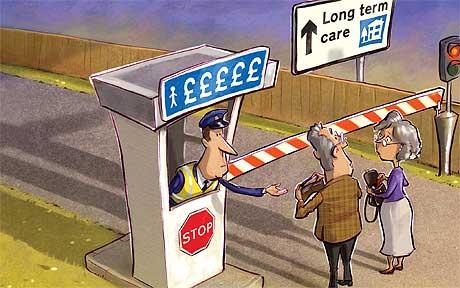
Cartoons: Howard MacWilliam. From http://www.telegraph.co.uk
There are so many misconceptions when it comes to long term care and Long Term Care Insurance. Tobe Lynn Gerard, a long term insurance adviser for over 30 years, reviews the most common misconception that people have shared with her over the years.
1. “I don’t need to buy Long Term Care Insurance because I have Medicare!”
The most Medicare will cover is 100 days in each Benefit period. In addition, the long term care benefit that is available through Medicare requires a three night hospital stay (as well as other criteria) before the long term care benefit can even be triggered. Lastly, because we don’t have a crystal ball we have no idea what Medicare will or won’t reimburse in the future.
2. “I don’t need to buy Long Term Care Insurance because I can just go on Medicaid!”
Medicaid is an entitlement program that has been designed for people who have limited assets and limited income. If you have significant assets, qualifying for Medicaid doesn’t make sense because it requires that you “spend down” those assets to an almost poverty level. Relying on any governmental program to provide for your long term care needs isn’t a sound planning tool because government programs are always susceptible to drastic cuts.
3. “I don’t need to buy Long Term Care Insurance because I have health insurance where I work!”
Similar to the comments made above that relate to Medicare, the health insurance that you have through your employer rarely covers long term care.
4. “I don’t need to buy Long Term Care Insurance because it only covers me if I’m in a nursing home and I would never to go to a nursing home!”
Almost all of the Long Term Care Insurance policies that are sold today are “comprehensive”. This means that they will reimburse you for care that is delivered in your home, in an assisted living, at an adult day care center, in a nursing home, as well as covering hospice services that are delivered in any of the settings just noted as well as in a hospice residence.
5. “I don’t need to buy Long Term Care Insurance now. I can just save my money and buy it when I’m closer to needing it!”
The premium for Long Term Care Insurance is predominantly determined by age, health, and gender so the longer you wait to buy Long Term Care Insurance the more expensive it will be over time. A simple spreadsheet can be produced that displays the cost of purchasing Long Term Care Insurance when you are 50 and paying a premium for 35 years versus the cost of purchasing Long Term Care Insurance when you are 65 and paying a premium for 20 years. In addition, while most people in their 50’s have few significant health issues and can easily get Long Term Care Insurance through multiple companies, we’ve seen many people who are uninsurable by the time they reach 65.
6. “I don’t need to buy Long Term Care Insurance because my kids will take care of me!”
Unless you are the rare person who has a son or a daughter who isn’t married and who isn’t working and who is living with you and who is willing to provide your care, the chances are that your children will not be able to take care of you even if they wanted to. Many children don’t live near their parents, so providing care isn’t even an option. The majority of women who were once the primary caregivers are now working full time as well as raising their own children. If you love your family, it is your responsibility to plan for your own long term care needs.
Tobe Lynn Gerard, LIA, CSA, CLTC, is a President of Tobe Gerard Insurance, LLC, the agency specializing exclusively in Long Term Care Insurance. She has always represented at least eight Long Term Care Insurance companies. You can reach her at (508) 653-8110 or tgerard@tobegerardinsurance.com .
NOTE: Remember to please consult with your own tax and financial professionals for customized advice and guidance. Ezra Home Care, LLC is not affiliated with Tobe Gerard Insurance, LLC.




 Tweet
Tweet
 Share
Share



